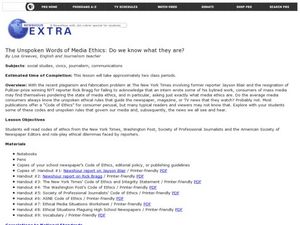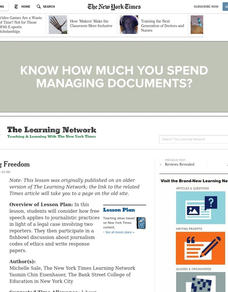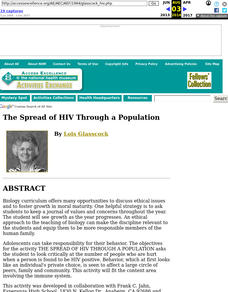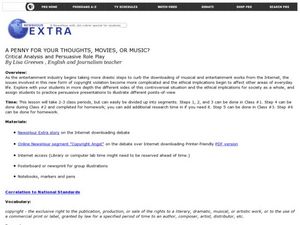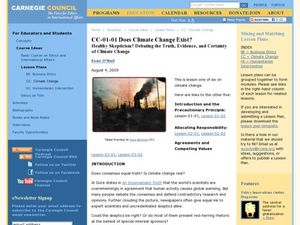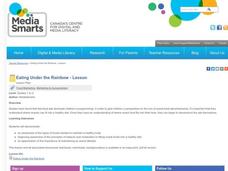Curated OER
The Unspoken Words of Media Ethics: Do we know what they are?
Students read codes of ethics from the New York Times, Washington Post, Society of Professional Journalists and the American Society of Newspaper Editors. For this Civics lesson, 10th graders role-play ethical dilemmas faced by...
iCivics
NewsFeed Defenders
How can people learn to spot viral deception? Players do just that with the NewsFeed Defenders media literacy game. Scholars choose avatars and the focus of their news feeds: student life, health and wellness, or sports and...
Curated OER
Press-ing Freedom
Students consider how free speech applies to journalistic practices in light of a legal case involving two reporters. They participate in a fishbowl discussion about journalism codes of ethics and write response papers.
Newseum
The Making of Fake News: A Case Study
"Fake News" (stories that are entirely fabricated/fictional) is the subject of a case study of the search for Jestin Coler, the creator of some of the most famous fake news stories. After reading NPR's investigative report, scholars...
Newseum
Covering a Catastrophe: Evaluating Disaster News
Young journalists investigate the various ways to share news about a disaster and evaluate the pros and cons of each of these types of news. Individuals then select two different forms of media reports of a recent disaster. Using the...
News Literacy Project
News Goggles: Ad or News?
Ever seen the labels "sponsored content," "native advertising," "advertorial," "paid post," "#ad," or "#sponsored?" If so, then you are looking at advertisements that are designed to appear as news stories. Learn how to tell the...
Newseum
Is This Story Share-Worthy?
Young journalists use a "Is This Story Share-Worthy?" flowchart graphic to decide whether a story is worth sharing online. Instructors provide groups with fake news, poor quality stories, opinion pieces, biased news, and high-quality...
Newseum
Civil Rights News Coverage: Looking Back at Bias
Not all southern newspapers covered the civil rights movement of the 1950s and 1960s. Young journalists investigate how The Lexington (Ky. Herald-Leader and The Jackson (Tenn.) Sun re-examined their coverage of the movement. After...
Facebook
The Verification Steps
Provenance, source, date, location, and motivation. High schoolers learn how to verify the authenticity of news stories and posts by following a seven-step process. They then use the strategy to determine the original site that posted a...
Curated OER
A Balancing Act
Students learn about the guiding ethical principles of professional journalists, evaluate hypothetical dilemmas and determine if these stories should "go to press", and determine how to frame a story and when/where to report it.
Curated OER
on Trial: Anonymous Sources, Promises of Confidentiality And Privacy
Students research the case of Matthew Cooper and Judith Miller, two reporters found in contempt of court for failing to divulge their sources. They participate in a mock trial as they consider the case from various points of view.
Curated OER
Worksheet #56 Questions - Judicial Terms
In this American judicial terms activity, students examine their knowledge through ten fill in the blank questions that relate to the aforementioned topic.
Facing History and Ourselves
#IfTheyGunnedMeDown
As part of their continued investigation of the reporting of the shooting of Michael Brown class members analyze photos of Michael Brown and the social media response to these images. The class then develops a guide they...
Curated OER
Finding and Authenticating Online Information on Global Development Issues
Students discover how to find authoritative resources. In this research skills lesson, students examine strategies for using the Internet effectively to research global development issues.
Curated OER
Media Arts Production
Students learn about the basic legal and ethical responsibilities shouldered by people making "reality" videos (i.e. videos with non-actors).
Curated OER
The Spread of HIV Through a Population
Students use a model to illustrate the spread of HIV through an adolescent population and, acting in the role of epidemiologists, explore the dilemmas of HIV infection presented by the simulation. beneficence and justice.
Curated OER
To Report or Not To Report?
Students examine the reasons why reporters do not report all they know about a given event. They identify basic journalist ethics at stake when a story isn't reported. They compare these issues with those in their local community.
Curated OER
A Penny for Your Thoughts, Movies, or Music?
Young scholars investigate copyright violation laws. In this media copyright lesson, students read two articles that discuss copyright laws, then they develop their own perspective on the laws. Young scholars then divide into...
Curated OER
Character Education Podcasts
Students study character traits. In this character education lesson, students create podcasts highlighting a particular character trait. Students broadcast one podcast per week.
Curated OER
Does Climate Change Exist? Healthy Skepticism? Debating the Truth, Evidence, and Certainty of Climate Change
Pupils study climate change and the arguments of scientists that it exists. In this climate change lesson students complete a class activity and answer questions.
Curated OER
Eating Under the Rainbow
Learners investigate the lure of snack-food advertisements to explain how snacks can fit into a healthy diet.
Curated OER
World Media: Comparison of Iraq War Accounts
Students are introduced to the concept of news/media bias from region to region. Upon reading differing articles, students answer source questions on the structure/content of each article.
PBS
Pbs Learning Media: The Documentary: A Fragile Trust: Lesson Plan
This lesson explores the Jayson Blair story and other cases where journalists have breached the code of ethics in their efforts to get the story out. Students will examine the journalism code of ethics and its importance. They will view...
PBS
Pbs: Legal and Ethical Aspects of Reality Television (Lesson Plan)
A lesson to help students understand the basic legal and ethical responsibilities involved in making reality videos. Requires access to an episode from "American High," the documentary aired on PBS about high school students from Chicago.


